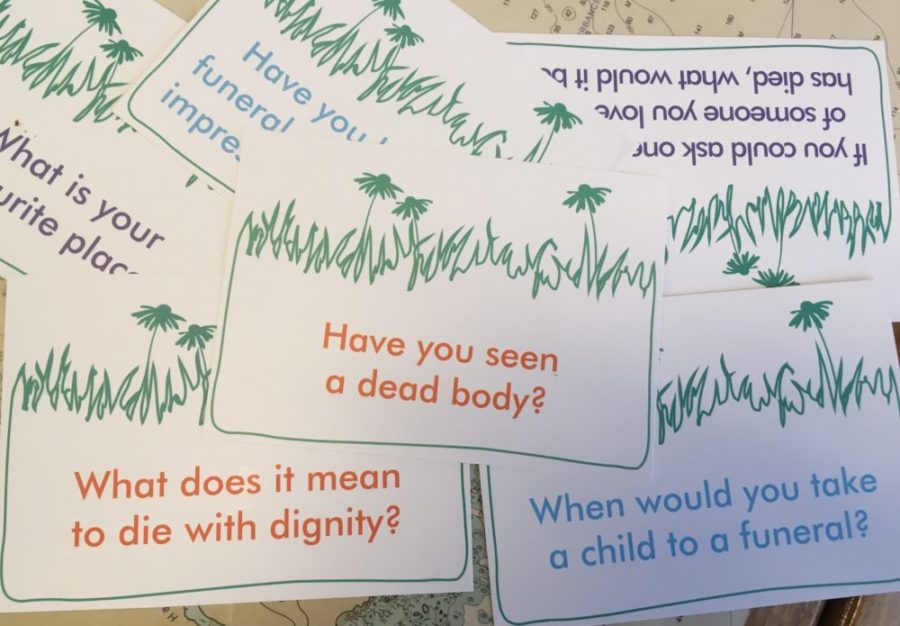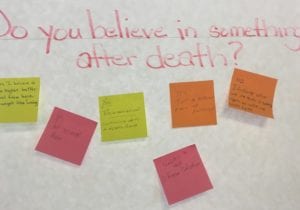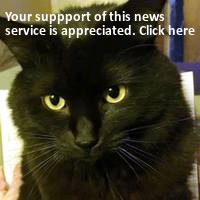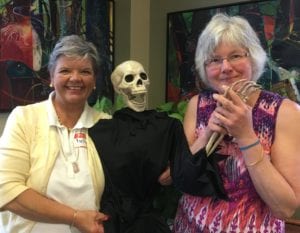
Topic cards to spark the conversation were on each table at Sunday’s Death Cafe. (KRBD photo by Leila Kheiry)
Two Ketchikan women are trying to make a difficult topic a little easier for people to talk about. Their big goal is to encourage more people to plan for their own end.
About 20 people showed up at The Point art café for a Sunday afternoon of cookies, cake, coffee and death.
Most people don’t like talking about death. It’s scary. It’s uncomfortable. But, death is also inevitable. Licha Kelley-King and Marzette Ellis are hospice volunteers, and they’re dedicated to helping people prepare for death.
“You gotta talk about sex, you gotta talk about death, right?” said Kelley-King, getting the discussion started. “Taxes? I’m here to tell you, you can avoid those.”
People sat at tables, in groups of three to five. On the tables were “gravetalk” cards with topics to spark the conversation. They had questions like: “Have you ever seen a dead body?”
The first group I joined, Greg and Patty Howe, and Felix Wong, were already talking.
 “The topic that we’re on is funerals and the impressions,” said Patty. “What was it you said to Felix? That the more ceremony?”
“The topic that we’re on is funerals and the impressions,” said Patty. “What was it you said to Felix? That the more ceremony?”
“The less meaning it had,” Greg said. “The more informal, outdoors, the more connected I felt to the person who had passed.”
But, the group could see how some people might need a more formalized, traditional ceremony. Wong said it can help them deal with the strong emotions surrounding the loss of a loved one.
Greg and Patty already have been talking about death. Greg has leukemia, and said the outcome is not really clear right now. Patty said nothing will really prepare her for Greg leaving her.
“But, talking about it, it’s not something that we’re ignoring or saying it’s not going to happen,” she said. “We’re just embracing every day as it comes and not letting it define us. And also at 65, realizing just how short life is.”
Damieo Suarez learned that lesson at an early age. He told a separate group a story about when he was 15, living in Miami, Florida, and his 20-something brother-in-law was killed. Suarez said he didn’t believe it at first.
“I was in complete denial. I was like, ‘No way. He can’t just die. There’s no way.’ Completely blew it off. Complete denial,” he  said. “I didn’t believe it until I got to the funeral and saw his body in the casket.”
said. “I didn’t believe it until I got to the funeral and saw his body in the casket.”
Suarez said that experience made him realize anyone could die at any time, and it made him more aware of how he treats everyone he meets.
“I try to be really, like, caring and there for them. I don’t want someone to be home and think, ‘Man, nobody really cares. No one cares if I do this. It doesn’t matter if I do that. Because no one is going to remember me,’” he said. “I would hope they would think: ‘Oh, yeah, this guy. He’s always there. He always wants to talk to me.’”
Not a typical small-talk conversation among people who have just met, right?
Death Café is new for Ketchikan, but it’s not a new concept. There’s even a website with information about how to get a Death Café started.
Marzette Ellis said she and Kelley-King already have been holding monthly open-house opportunities to help anyone who shows up make an advanced health-care directive.
“Well, not enough people were showing up,” she said. “We were getting three or four, which was fabulous. We were thankful. We’re thankful for one person. It’s a profound experience and we invite anybody and everybody. But we needed a way to reach more people and get more people talking.”

Licha Kelley-King, left, and Marzette Ellis. (KRBD photo by Leila Kheiry)
And while researching that topic, they found the Death Café.
Kelley-King said the goal is to make death less negative. And the two women are quite positive about the topic, to the point where their family members have asked them to be more serious.
“(They say,) ’You guys are laughing too much about death. Death isn’t funny,’” Kelley-King said. “Well, death is funny. Death is not a scary – you don’t have to be crying and weeping over death.”
Kelley-King said the crying and weeping is, in part, because of uncertainty. That can be relieved somewhat by a formal plan.
But at a Death Café, people who show up know what they are going to be talking about. So, what about the other 12,980 people – approximately – in the Ketchikan Gateway Borough? How to reach them?
Well, Ellis said, they’ve invited lots of people.
“Nine times out of 10, the conversation goes nowhere. Period. Nowhere,” she said. “And, that’s what they say: You have these early – you start with the people who want to come.”
And, it’s hoped, those people will continue the difficult conversations outside of the Death Café, helping society at large make the end of life a little less uncertain and a little less scary.
You can talk with Ellis and Kelley-King about making an advanced health-care directive through Courageous Conversations, which is at 10 a.m. on the second Saturday of each month at Rendezvous Senior Day Center.






